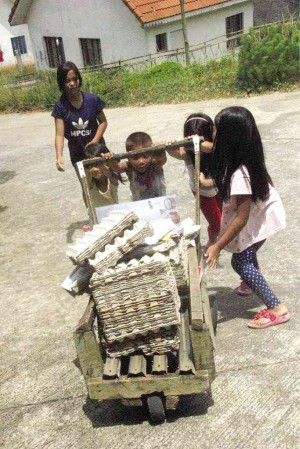In Rizal town, recycling turns trash into school supplies

CHILDREN in Tanay, Rizal, push a cart of egg cartons that they would exchange for school supplies under a recycling program of the municipal government. PHOTO FROM TANAY MENRO
A recycling project in a town in Rizal province is turning waste into school supplies.
The municipal government of Tanay, Rizal, has launched a program, called “Basura Mo, Palit Gamit Eskwela (Your Trash In Exchange for School Supplies),” that offers school supplies in exchange for recyclable materials.
Residents could trade in empty bottles, tin cans, old newspapers for pencils, ball pens or notebooks under the program.
“Initially, we were targeting those in day-care centers or in Grade 1 because we wanted to teach waste segregation to children at an early stage,” said Carlos Inofre Jr., Tanay environment officer.
“But now, even high school students are joining. It’s like everyone’s doing it,” he said.
Article continues after this advertisementAt least once a week, staffers of Inofre’s office visit the villages and schools, even the remotest ones in upland Tanay, to swap the trash for school supplies.
Article continues after this advertisementThey also hold story-reading sessions to teach children about solid waste management and environment protection.
The redemption follows a point system. For instance, an empty liquor bottle is worth two points. A number of points has a corresponding school material: five points for a pencil and 10 points for a notebook.
“There was one child who was able to collect 400 points,” he said. “The parents did not have to spend anything for the school supplies,” Inofre added in a phone interview.
The project runs year-round, although Inofre said it peaks right before school opening. His office is doing it again this year, following last year’s success when the project was first launched, he said.
In 2013, the Tanay Municipal Environment and Natural Resources Office collected and swapped P200,000 worth of recyclable wastes from about 2,000 students.
The collected trash is sold to junk shops and the money earned from it is used to buy the next batch of school supplies.
While most beneficiaries are poor children, Inofre said some also come from families with average income.
“The project also gained support from the parents that there was once a child who brought in a bottle of soy sauce that was still half full,” he said.
The municipality of Tanay is composed of 20 villages, half of which are upland villages and are inhabited by indigenous Dumagats.
The town is also a part of three different watersheds—the upper Marikina watershed, the Kaliwa watershed and the Tanay microwatershed.
At the height of Typhoon “Ondoy” in 2009, the microwatershed overflowed and flooded lowland Tanay. The town recorded 62 fatalities.
Since then, the municipality has started focusing its programs on raising environmental awareness, Inofre said.
In 2012, the municipality enforced a waste segregation program to minimize its solid wastes.